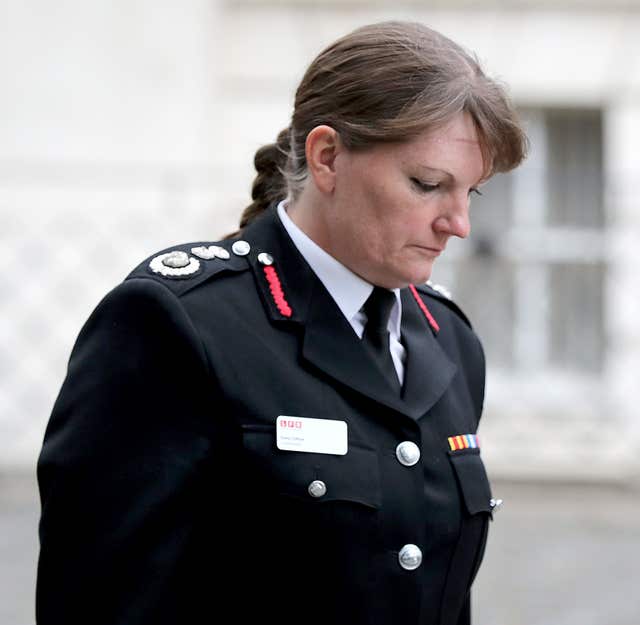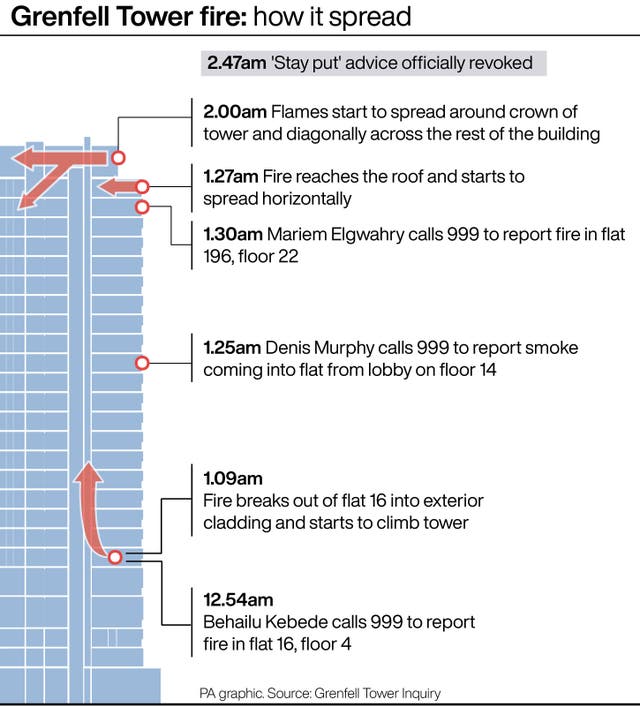A fatal fire at a housing block in 2009 should have alerted the London Fire Brigade (LFB) to the “shortcomings” in its ability to fight blazes in high-rise buildings, the final report of the inquiry into the Grenfell Tower disaster has found.
The report found that the Lakanal House fire in Camberwell, south London, “foreshadowed” the 2017 Grenfell Tower blaze.
It concluded that the LFB failed to “implement any effective response” to the fire in July 2009, which claimed six lives, despite understanding its lessons.
The report identified several key measures that should have been implemented by the LFB following that incident.
These included making better use of the knowledge it had gained of the dangers posed by modern materials and methods of construction, and providing regular training for its control room operators on handling many fire survival guidance calls at the same time.
“The tragic conclusion is that the Lakanal House fire in July 2009 forewarned the LFB about the existence of the shortcomings which revealed themselves once more on the night of 14 June 2017,” the report said.
“Those shortcomings could have been avoided if the LFB had been more effectively led in a number of respects, particularly in its response to the Lakanal House fire, and if use had been made of its knowledge of the dangers flowing from modern materials and methods of construction.
“On any view, that is a serious indictment of an organisation whose principal purpose is to protect the public, and of the quality of its leadership.”

Laying the blame at the feet of the LFB’s senior leadership, the report said this failure had many causes, including a “chronic lack of effective leadership”, combined with “undue emphasis on process and a culture of complacency”.
It named former LFB commissioners Roy Dobson and Dany Cotton as bearing “ultimate responsibility for the LFB’s inability to take effective action after the Lakanal House Fire”.
During the first phase of the inquiry, Ms Cotton said she would change nothing about her team’s response on the night of the Grenfell Tower fire.
Ms Cotton, who was the first female commissioner of the LFB, later stepped down in December 2019 in the wake of criticism over the service’s response.

The report also addressed the issue of the “stay put strategy” used during the Grenfell Tower fire.
The Grenfell Inquiry’s final report found that the strategy is only acceptable “if there is negligible risk of fire escaping into and spreading through the external wall”.
Calculating the risk of fire spread and the time needed for evacuations is a matter for a qualified fire engineer, the report added.
The report made a number of recommendations regarding the LFB in light of its findings.
These include establishing a College of Fire and Rescue to train firefighters, providing firefighters with digital radios, and training on how to respond appropriately to the loss of communications.
The report also recommended that His Majesty’s Inspectorate of Constabulary and Fire and Rescue Services carry out inspections on the LFB’s training of incident commanders, its operational planning, its arrangements for implementing change, and its use of control rooms.
The Fire Brigades Union (FBU) called for the Government to go further than its recommendations.
General secretary Matt Wrack said the deregulation of recent decades must be “comprehensively reversed”.
He added: “The systems for delivering building safety must be brought under public ownership and must be given the resources they need.”
The London Fire Brigade said it was now “better prepared” to respond to high-rise fires but would not be “complacent”.
Commissioner Andy Roe said the brigade accepted every recommendation from the phase one report, and has since implemented “significant changes”.
These changes include new equipment, improved training, and better ways of responding to fires in high-rise residential buildings.




Why are you making commenting on The Herald only available to subscribers?
It should have been a safe space for informed debate, somewhere for readers to discuss issues around the biggest stories of the day, but all too often the below the line comments on most websites have become bogged down by off-topic discussions and abuse.
heraldscotland.com is tackling this problem by allowing only subscribers to comment.
We are doing this to improve the experience for our loyal readers and we believe it will reduce the ability of trolls and troublemakers, who occasionally find their way onto our site, to abuse our journalists and readers. We also hope it will help the comments section fulfil its promise as a part of Scotland's conversation with itself.
We are lucky at The Herald. We are read by an informed, educated readership who can add their knowledge and insights to our stories.
That is invaluable.
We are making the subscriber-only change to support our valued readers, who tell us they don't want the site cluttered up with irrelevant comments, untruths and abuse.
In the past, the journalist’s job was to collect and distribute information to the audience. Technology means that readers can shape a discussion. We look forward to hearing from you on heraldscotland.com
Comments & Moderation
Readers’ comments: You are personally liable for the content of any comments you upload to this website, so please act responsibly. We do not pre-moderate or monitor readers’ comments appearing on our websites, but we do post-moderate in response to complaints we receive or otherwise when a potential problem comes to our attention. You can make a complaint by using the ‘report this post’ link . We may then apply our discretion under the user terms to amend or delete comments.
Post moderation is undertaken full-time 9am-6pm on weekdays, and on a part-time basis outwith those hours.
Read the rules here